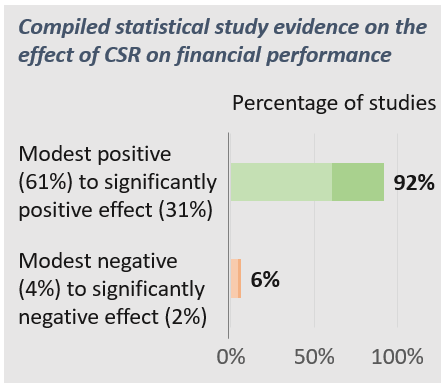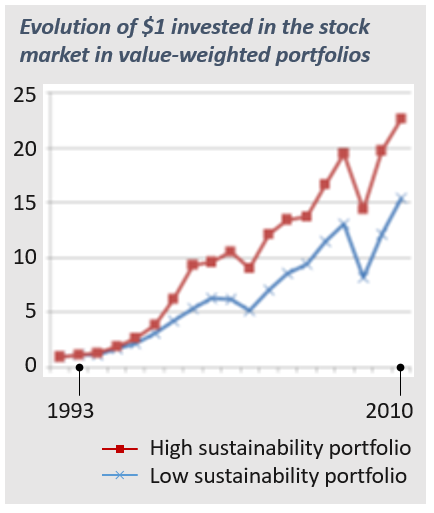Does CSR actually pay off?
Executive Factsheet
Yes, on average, Corporate Social Responsibility (CSR) pays off.
There is a clear scientific evidence that even though CSR policies often entail higher costs, overall it does not destroy firm value but instead, CSR tends to increase it, at least modestly.
Download the PDF: Does CSR actually pay off?
Facts and Figures
Extensive empirical research has been conducted to determine whether engaging in CSR is financially beneficial or detrimental to firms. Although the results of these studies are mixed, the overall evidence leans towards a positive effect of CSR on financial performance.(1) In fact:
In fact:
- In 92% of the studies, CSR is shown to generate a net financial benefit (or at least not to cause financial loss.
- Only 6% of studies present either modest or significant evidence of CSR leading to net financial loss.

Source: Reference (1)
Some other studies demonstrate that CSR engagement tends to increase shareholder value, both in the short and long run.
Firms that adopt a CSR-related proposal by only a small margin of shareholder votes display shareholder returns higher by about 1% on the day of the shareholder meeting than those that reject such proposal by an equally small margin of votes.(2)
When it comes to the longer term returns of CSR, according to estimations $1 invested in 1993 in a value-weighted portfolio of “high sustainability” companies* would have grown to $22.6 by the end of 2010. By contrast, $1 invested in a portfolio of low sustainability companies would have only grown to $15.4 within the same time frame.(3)
* These are firms that have adopted a substantial number of social and environmental policies in the early 1990s.

Source: Reference (3)
How does CSR affect financial performance?
A firm’s success depends on the (monetary and non-monetary) resources that its stakeholders grant it access to – this includes both monetary and non-monetary resources, such as goodwill and work engagement. Investing in CSR can ease the access to such stakeholder-related resources. It may, for instance:
- Increase customers’ brand loyalty by adapting to their demands for an increased engagement with social and environmental issues;
- Lower ESG (environmental, social, and governance) risks and thereby make the firm more attractive to long-term holding institutional shareholders;
- Increase employees’ motivation and productivity;
- Increase the likelihood of accommodation with regulators.
- CSR’s positive effects on a firm’s stakeholder relationships are also related to the fact that commitment to CSR generally goes along with increased stakeholder interaction. In fact, firms that are more engaged in CSR also tend to have more comprehensive and established stakeholder management processes in place.(3)
In addition, engaging in CSR can help a firm develop its innovation capabilities, i.e., stimulate product and process innovations that are not only beneficial to broader society and the environment but can also be exploited to the company’s advantage.
What’s the catch?
The positive relationship between CSR and financial performance is evident and consistent.
Not engaging in CSR can be very costly if a firm is later implicated in a scandal: CSR increases firms’ resilience to scandals by providing an insurance-like protection against reputational damages (at least for first-time offenders).
More generally speaking, since CSR returns may vary, CSR should be managed strategically in order to ensure positive financial outcomes.
REFERENCES
1- Margolis, J. D., Elfenbein, H. A., & Walsh, J. P. (2009). Does it pay to be good... and does it matter? A meta-analysis of the relationship between corporate social and financial performance. Available at SSRN: https://ssrn.com/abstract=1866371
2- Flammer C. 2015. Does corporate social responsibility lead to superior financial performance? A regression discontinuity approach. Management Science 61(11), 2549-2568.
3- Eccles, R. G., Ioannou, I., & Serafeim, G. (2014). The impact of corporate sustainability on organizational processes and performance. Management Science, 60(11), 2835-2857.
Discover the Inclusive and Social Business Certificate
Discover the Master on Sustainability and Social Innovation
More about the Movement for Social*Business Impact